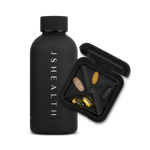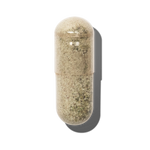5 Tips To Prevent That 3pm Slump
Ever wondered why you’re feeling sluggish at that 3pm mark? It’s an all too common complaint. At this time, we tend to experience an energy drop and consequently can feel tempted by the jar of office biscuits, caffeinated drinks or the vending machine. It is also easy to succumb to standing at the fridge and eat mindlessly throughout the afternoon.
Here are some reasons why you may be experiencing the 3pm slump:
Irregular sleep patterns
Do you ever find some nights you’re in bed by 8pm and fall asleep without a problem, then the next night you’re scrolling Instagram and watching Netflix at midnight? An irregular sleeping schedule is becoming a prominent issue, especially among young adults and office workers. This lack of sleep really tends to hit people at that 3pm mark and can leave you feeling tired, lethargic, lazy and craving sugar.
Solution: Establish a good night time routine and put your phone away 1-2 hours before bedtime. Eat a few hours before bedtime to support digestion and practice some self-care to help you wind down.
Inadequate protein
Protein rich foods contain amino acids which help us to feel fuller for longer. When we aren’t consuming sufficient amounts, it can result in feelings of fatigue and hunger.
Solution: Aim to include a serving of protein at breakfast and lunch such as: Greek yoghurt, protein powder, nuts, ricotta, eggs, beans, chicken or salmon to help reduce that afternoon slump.
Refined Carbs at lunch
Do you ever notice that when you have refined carbohydrates for lunch you tend to feel more sluggish and lethargic in the afternoon? This often happens when we don’t make or bring our own food to work. Consequently, this can lead to grabbing a less nutritious convenient takeaway option from the food court. This can then trigger that pesky afternoon slump because white refined carbohydrates deliver glucose to the blood quickly, resulting in a brief rise and then drop in blood sugar levels.
Solution: This doesn’t mean you still can’t enjoy carbs for lunch, in fact, you should! They’re a great source of fibre and can assist with keeping you energised for the rest of the day. It’s just about which carbs we choose. Opt for wholegrain varieties such as brown rice, buckwheat and quinoa or starchy veg such as sweet potato, carrot, pumpkin or beetroot.
Excess Caffeine
Despite caffeine being a stimulant which means it can work to increase energy levels, caffeine also raises cortisol levels. Therefore, too much coffee can disrupt our stress response reactions which may have health consequences if excessive intake is maintained. For some people, chronic high intake can result in dependence which means our body is waiting for the next caffeine hit. Therefore, if we don’t get it we can feel lethargic or some people even experience headaches.
Solution: Enjoy your 1 cup of coffee, preferably prior to 10am. When you find that second craving coming on, swap the next coffee for a dandelion chai tea (caffeine free), peppermint or chamomile herbal tea.
Skipping Breakfast
Irregular eating patterns such as skipping breakfast can disturb our sleep cycle and circadian rhythm. Consuming a protein rich breakfast also enhances satiety, keeping us fuller and reducing food cravings later on. These food cravings tend to be most prominent at the 3pm mark. Often what we feel in the afternoon is a reflection of our food intake earlier that day.
Solution: Can’t stomach food within a few hours of waking? Try just having a small snack such as some Greek yoghurt with berries or a banana and a handful of nuts. Time poor? Prep the night before. Overnight oats or a smoothie are one of the easiest options to grab and go.
Do you find that you turn to caffeine or an energy drink to try reverse this? Say 3pm slump no more! Try our Metabolism + Sugar Support Vitamins. These are scientifically formulated containing ingredients to support the metabolism of glucose, which helps to regulate blood sugar levels.
Need some 3pm snack ideas?
- A DIY trail mix
- Greek yoghurt with cinnamon
- 1-2 boiled eggs
- 1-2 JSHealth protein balls
- Cut up veggie sticks dipped in nut butter or ricotta
These snacks and more can be found here!
You can find plenty more informative articles, nutrition guides and also get access to a nutritionist in your pocket with the JSHealth App. You can download the app here!
References:
- Kang J, Chen S. Effects of an irregular bedtime schedule on sleep quality, daytime sleepiness, and fatigue among university students in Taiwan. BMC Public Health. 2009;9(1):248.
- Lennerz B, Alsop D, Holsen L, Stern E, Rojas R, Ebbeling C et al. Effects of dietary glycemic index on brain regions related to reward and craving in men. The American Journal of Clinical Nutrition. 2013;98(3):641-647.
- Lovallo W, Whitsett T, al’Absi M, Sung B, Vincent A, Wilson M. Caffeine Stimulation of Cortisol Secretion Across the Waking Hours in Relation to Caffeine Intake Levels. Psychosomatic Medicine. 2005;67(5):734-739.
- Leidy H, Lepping R, Savage C, Harris C. Neural Responses to Visual Food Stimuli After a Normal vs. Higher Protein Breakfast in Breakfast-Skipping Teens: A Pilot fMRI Study. Obesity. 2011;19(10):2019-2025.
- O'Callaghan F, Muurlink O, Reid N. Effects of caffeine on sleep quality and daytime functioning. Risk Management and Healthcare Policy. 2018;Volume 11:263-271.
- Leidy H, Racki E. The addition of a protein-rich breakfast and its effects on acute appetite control and food intake in ‘breakfast-skipping’ adolescents. International Journal of Obesity. 2010;34(7):1125-1133.
- Leidy H, Gwin J, Roenfeldt C, Zino A, Shafer R. Evaluating the Intervention-Based Evidence Surrounding the Causal Role of Breakfast on Markers of Weight Management, with Specific Focus on Breakfast Composition and Size. Advances in Nutrition. 2016;7(3):563S-575S.
- McKiernan F, Houchins J, Mattes R. Relationships between human thirst, hunger, drinking, and feeding. Physiology & Behavior. 2008;94(5):700-708.
















































































